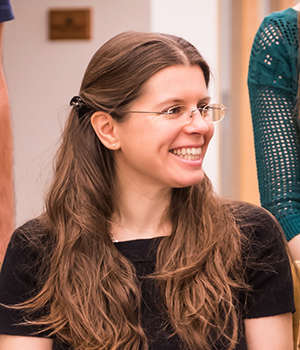
Anna Frebel
(she/her)
Physics
Listening and lifting up
Frebel says that “it is a gift to be able to tell, especially younger women, You can do it—I believe in you and your ideas.” As a tenured woman professor and single mother of two young children, Anna Frebel feels she is a de facto role model for others.
Frebel joined the MIT physics faculty in 2012 as Assistant Professor and was promoted to Associate Professor of Physics with tenure in 2018. Frebel is best known for her discoveries, and subsequent analyses, of the oldest stars in the universe. Her research offers insight into how these stars can be used to understand the first billion years after the Big Bang, the beginning of star and galaxy formation, and the origin of the chemical elements.
Supporting women in Physics
The career path of a woman in physics is bumpier than it should be. “I have seen too many cases where women have been left unprepared for what’s to come because advisors were too busy or didn’t care to share insight,” Frebel laments. To help address a lacuna in advising, Frebel developed a series of professional career development seminars to offer graduate women in MIT’s Department of Physics practical tools and insights on many unspoken topics and expectations in academia, including how to navigate conferences, prepare for job interviews, and address unforeseen challenges in the work place. She is now expanding this effort into a full graduate student class on leadership and professional strategies and skills that she will co-teach with Dr. Diane Rigos in the Spring 2020 semester.
Frebel has been regularly meeting with the Graduate Women in Physics and other groups. A recurring topic during these meetings is that many women feel they cannot afford to “upset” their advisor by discussing a range of issues, from bringing up “stupid questions” (which are hardly ever stupid), what research expectations they are supposed to fulfill, requests for resources or accommodations, to their general wellbeing and not being fully respected in group situations, notes Frebel.
However, if a problem is not surfaced, it cannot be addressed, leading to a culture where students are often forced to live with varying forms and levels of toxicity and resentment that slowly builds up over time. Faculty advisors may not know what to do when a student raises such issues. Frebel says that as a key first step, advisors should listen and accept, not question, the lived experiences of the student. Then, they need to educate themselves “with trusted folks who can advise on change and a course of action.”
It is also paramount for a department to develop policies to set expectations for peer behavior and community values while also, in Frebel’s words, “broadcasting that poor behavior in the work place is never welcome in the first place.” For example, the Department of Physics has developed a list of Community Values.
Communicating respect
Frebel notes that it is a challenge when students are not comfortable bringing up “the little things.” Small problems often snowball into serious issues, so it’s important to come forward sooner rather than later, she says. Frebel encourages students and postdocs to write to her about sensitive or personal issues that they may not wish to discuss in public or in person. Providing such open channels for communication is one of the Mentoring Guideposts identified by the Committed to Caring (C2C) program.
Frebel checks in with her students regularly to make sure they are okay (another Mentoring Guidepost). However, she emphasizes, “I wouldn’t want anyone to feel like they have to chat with me just because I asked them.” She makes sure to allow students a graceful exit from the exchange.
Frebel’s goal is to make time, demonstrate respect for her students, and to treat them as junior colleagues. Such behaviors, she says, “govern healthy relationships between people.” One student remarks that Frebel’s “compassion and commitment to caring” have made the department a friendlier, stronger, and more inclusive place.
